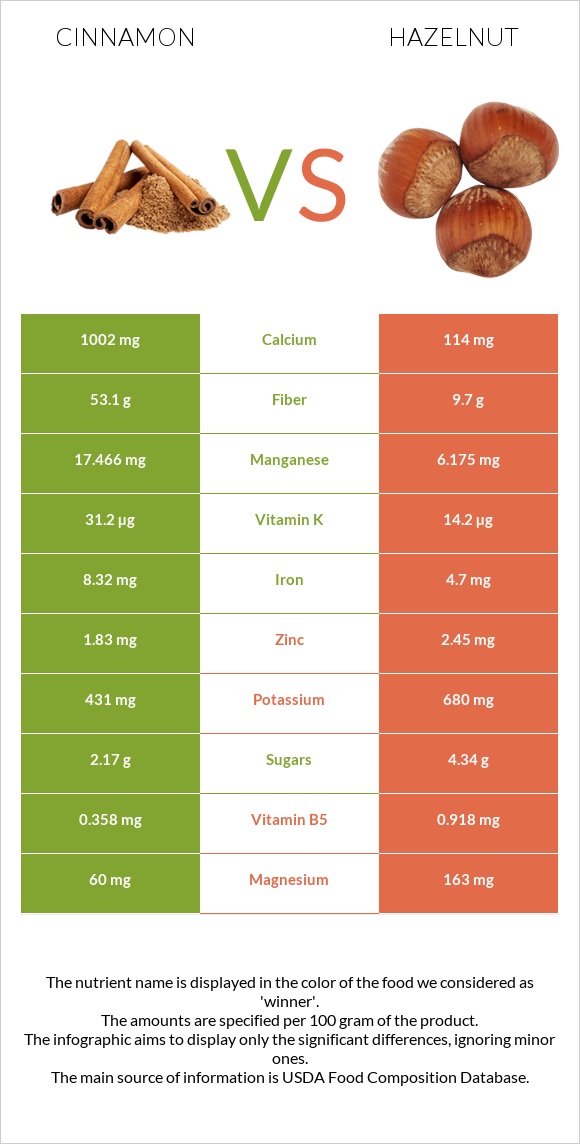Cinnamon vs. Hazelnut — In-Depth Nutrition Comparison
Compare
Significant differences between cinnamon and hazelnut
- Cinnamon is richer in manganese, fiber, calcium, and iron, while hazelnut is higher in copper, vitamin E, vitamin B1, phosphorus, vitamin B6, and folate.
- Cinnamon covers your daily manganese needs 491% more than hazelnut.
- Cinnamon has 9 times more calcium than hazelnut. Cinnamon has 1002mg of calcium, while hazelnut has 114mg.
Specific food types used in this comparison are Spices, cinnamon, ground and Nuts, hazelnuts or filberts.
Infographic

Infographic link
Mineral Comparison
Mineral comparison score is based on the number of minerals by which one or the other food is richer. The "coverage" charts below show how much of the daily needs can be covered by 300 grams of the food.
| Contains more CalciumCalcium | +778.9% |
| Contains more IronIron | +77% |
| Contains more ManganeseManganese | +182.9% |
| Contains more SeleniumSelenium | +29.2% |
| Contains more MagnesiumMagnesium | +171.7% |
| Contains more PotassiumPotassium | +57.8% |
| Contains more CopperCopper | +408.8% |
| Contains more ZincZinc | +33.9% |
| Contains more PhosphorusPhosphorus | +353.1% |
| Contains less SodiumSodium | -100% |
Vitamin Comparison
Vitamin comparison score is based on the number of vitamins by which one or the other food is richer. The "coverage" charts below show how much of the daily needs can be covered by 300 grams of the food.
| Contains more Vitamin AVitamin A | +1400% |
| Contains more Vitamin KVitamin K | +119.7% |
| Contains more Vitamin CVitamin C | +65.8% |
| Contains more Vitamin EVitamin E | +547.8% |
| Contains more Vitamin B1Vitamin B1 | +2822.7% |
| Contains more Vitamin B2Vitamin B2 | +175.6% |
| Contains more Vitamin B3Vitamin B3 | +35.1% |
| Contains more Vitamin B5Vitamin B5 | +156.4% |
| Contains more Vitamin B6Vitamin B6 | +256.3% |
| Contains more FolateFolate | +1783.3% |
All nutrients comparison - raw data values
| Nutrient |  |
 |
DV% diff. |
| Manganese | 17.466mg | 6.175mg | 491% |
| Fiber | 53.1g | 9.7g | 174% |
| Copper | 0.339mg | 1.725mg | 154% |
| Monounsaturated fat | 0.246g | 45.652g | 114% |
| Fats | 1.24g | 60.75g | 92% |
| Calcium | 1002mg | 114mg | 89% |
| Vitamin E | 2.32mg | 15.03mg | 85% |
| Vitamin B1 | 0.022mg | 0.643mg | 52% |
| Polyunsaturated fat | 0.068g | 7.92g | 52% |
| Iron | 8.32mg | 4.7mg | 45% |
| Phosphorus | 64mg | 290mg | 32% |
| Vitamin B6 | 0.158mg | 0.563mg | 31% |
| Folate | 6µg | 113µg | 27% |
| Magnesium | 60mg | 163mg | 25% |
| Protein | 3.99g | 14.95g | 22% |
| Carbs | 80.59g | 16.7g | 21% |
| Calories | 247kcal | 628kcal | 19% |
| Saturated fat | 0.345g | 4.464g | 19% |
| Vitamin K | 31.2µg | 14.2µg | 14% |
| Vitamin B5 | 0.358mg | 0.918mg | 11% |
| Potassium | 431mg | 680mg | 7% |
| Zinc | 1.83mg | 2.45mg | 6% |
| Vitamin B2 | 0.041mg | 0.113mg | 6% |
| Choline | 11mg | 45.6mg | 6% |
| Vitamin C | 3.8mg | 6.3mg | 3% |
| Vitamin B3 | 1.332mg | 1.8mg | 3% |
| Vitamin A | 15µg | 1µg | 2% |
| Selenium | 3.1µg | 2.4µg | 1% |
| Fructose | 1.11g | 0.07g | 1% |
| Net carbs | 27.49g | 7g | N/A |
| Sugar | 2.17g | 4.34g | N/A |
| Starch | 0.48g | 0% | |
| Sodium | 10mg | 0mg | 0% |
| Tryptophan | 0.049mg | 0.193mg | 0% |
| Threonine | 0.136mg | 0.497mg | 0% |
| Isoleucine | 0.146mg | 0.545mg | 0% |
| Leucine | 0.253mg | 1.063mg | 0% |
| Lysine | 0.243mg | 0.42mg | 0% |
| Methionine | 0.078mg | 0.221mg | 0% |
| Phenylalanine | 0.146mg | 0.663mg | 0% |
| Valine | 0.224mg | 0.701mg | 0% |
| Histidine | 0.117mg | 0.432mg | 0% |
| Omega-3 - ALA | 0.011g | N/A |
Macronutrient Comparison
Macronutrient breakdown side-by-side comparison
| Contains more CarbsCarbs | +382.6% |
| Contains more WaterWater | +99.2% |
| Contains more OtherOther | +57.2% |
| Contains more ProteinProtein | +274.7% |
| Contains more FatsFats | +4799.2% |
Fat Type Comparison
Fat type breakdown side-by-side comparison
| Contains less Sat. FatSaturated fat | -92.3% |
| Contains more Mono. FatMonounsaturated fat | +18457.7% |
| Contains more Poly. FatPolyunsaturated fat | +11547.1% |
Carbohydrate type comparison
Carbohydrate type breakdown side-by-side comparison
| Contains more GlucoseGlucose | +1385.7% |
| Contains more FructoseFructose | +1485.7% |
| Contains more StarchStarch | +∞% |
| Contains more SucroseSucrose | +20900% |
~equal in
Lactose
~0g
~equal in
Maltose
~0g
~equal in
Galactose
~0g





